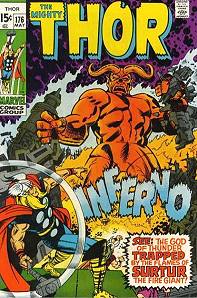 The Fall of Asgard
The Fall of Asgard
 The Fall of Asgard
The Fall of Asgard
Writer: Stan Lee. Pencils: Jack Kirby. Inks: Vince Colletta, Bill Everett.
Thor #175-177 (1970)
Ragnarok/the end of Asgard/the universe is doomed! sagas are a dime a dozen in Thor comics, the idea revisited seeming every few months. As such, the idea can get a bit over done. Yet I have a great fondness for this three part tale. Partly it's that length -- just long enough to have a certain epic grandeur, just short enough that it's a fairly tight telling of the tale. I have no idea if this was the first time a tale like this had been told, though I doubt it, nor whether it was the longest to that point (though certainly multi-part stories weren't as common to the series as they are now). Nor can I simply dismiss my affection for this as rose-tinted nostalgia -- I only first read it a couple of years ago!
Odin retreats into a kind of hibernation -- the Odinsleep! -- that apparently he needs to do every few centuries to refurbish his energy. But with the cat away, the mice get ideas, so Loki leads an army of Trolls to attack Asgard, leaving Thor and the usual gang to fight him off. But Loki manages to steal the Odin ring, a symbol of authority that means all must accept his rule, allowing him to usurp the throne. But with Odin away, Surtur, the fire demon, also has plans for universal Armageddon, making Loki the least of Thor's worries.
For just under 60 pages, it's a jam packed saga. I mean, the Loki-usurps-the-throne could've been a saga itself, instead that's only part of it, allowing the story to twist and turn and not just hammer away at the same plot points for three issues. As well, the story makes good use of the cast of characters, giving the regulars their moments, or even little plot threads to call their own, with Balder, Sif, the Warrior's Three -- even Karnilla -- having an impact on the plot, not just there to fill out a panel. There's humour supplied by Volstagg, there's teeth gnashing and character dilemmas, man-to-man fisticuffs, and sprawling battles as Asgardian hordes ride out to defend the realm. Kirby's pencils capture the raw emotion of the characters, yet is equally good at the grandeur of the scenes of armies on the field, and the eerie, unsettling vision of the giant Surtur striding forth, warriors like mice between his feet. The first issue is inked by Bill Everett, a beautiful pairing that reminds me a bit of Kirby's later preferred inker, Mike Royer. The next two issues are inked by Vince Colletta, whose compatibility/incompatibility with Kirby (and, indeed, many pencillers) has long been debated. Although I do wonder if Colletta was going for a deliberate look when inking Thor, the lines taking on a scratchy style as though meant to evoke a kind of story book ambience reminiscent of, say, Howard Pyle.
Lee has a great feel for the lyrical syntax of the characters, making for some appealing dialogue (Shakespeare-lite!) and milking it for melodramatic emotion, and theatricality. When we cut to a couple of nameless Asgardian warriors discussing the events and who then bear witness to the stirring of Surtur it kind of puts you in mind of the kind of bridging scene Shakespeare might've used (Scene: Enter two warriors...). Yet Lee also indulges in silly humour, such as when soldiers try to push Volstagg through a doorway and exclaim: "Into the dungeon with him! Squeeze! Squeeze!" The characters are full of do or die nobility that is actually kind of moving. The scene where Sif kneels over a mortally wounded Balder is quite touching.
The plotting can seem a bit half-baked at times -- the whole notion that Loki can steal Odin's ring and be automatically accepted as king, even by a grudging, angry Thor seems like a ludicrous plot gimmick. But Thor comics actually get away with things like that more than other comics would, because of their roots in mythology and legend. Let's face it -- a lot of old myths and fairy tales equally rely on such out-of-the-blue contrivances. Ironically, by employing them here, Lee & Kirby actually enhance the mythological flavour of these otherwise modern stories.
There's enough going on in terms of plotting and scenes, utilizing the cast, that it justifies its page count, seeming epic, full of grandeur...while being tight and concise enough that it doesn't out stay its welcome. I've re-read this more than once in the last few years. As mentioned, these kind of stories have been done a lot over the years -- Loki scheming to usurp the throne, hordes of Trolls laying siege to Asgard, Surtur striding the realm, threatening to set fire to existence. And, honestly -- this stands as one of the best.